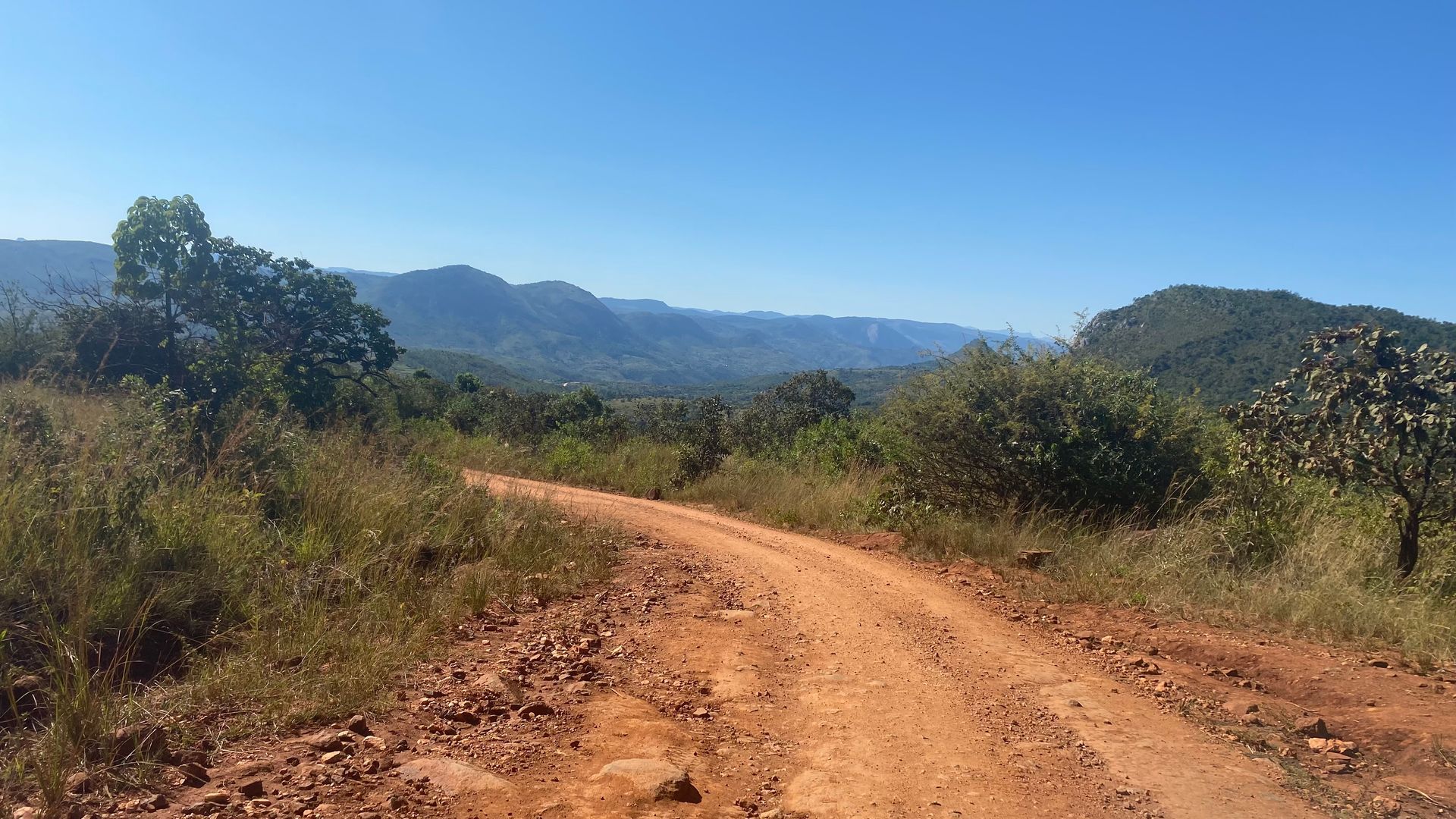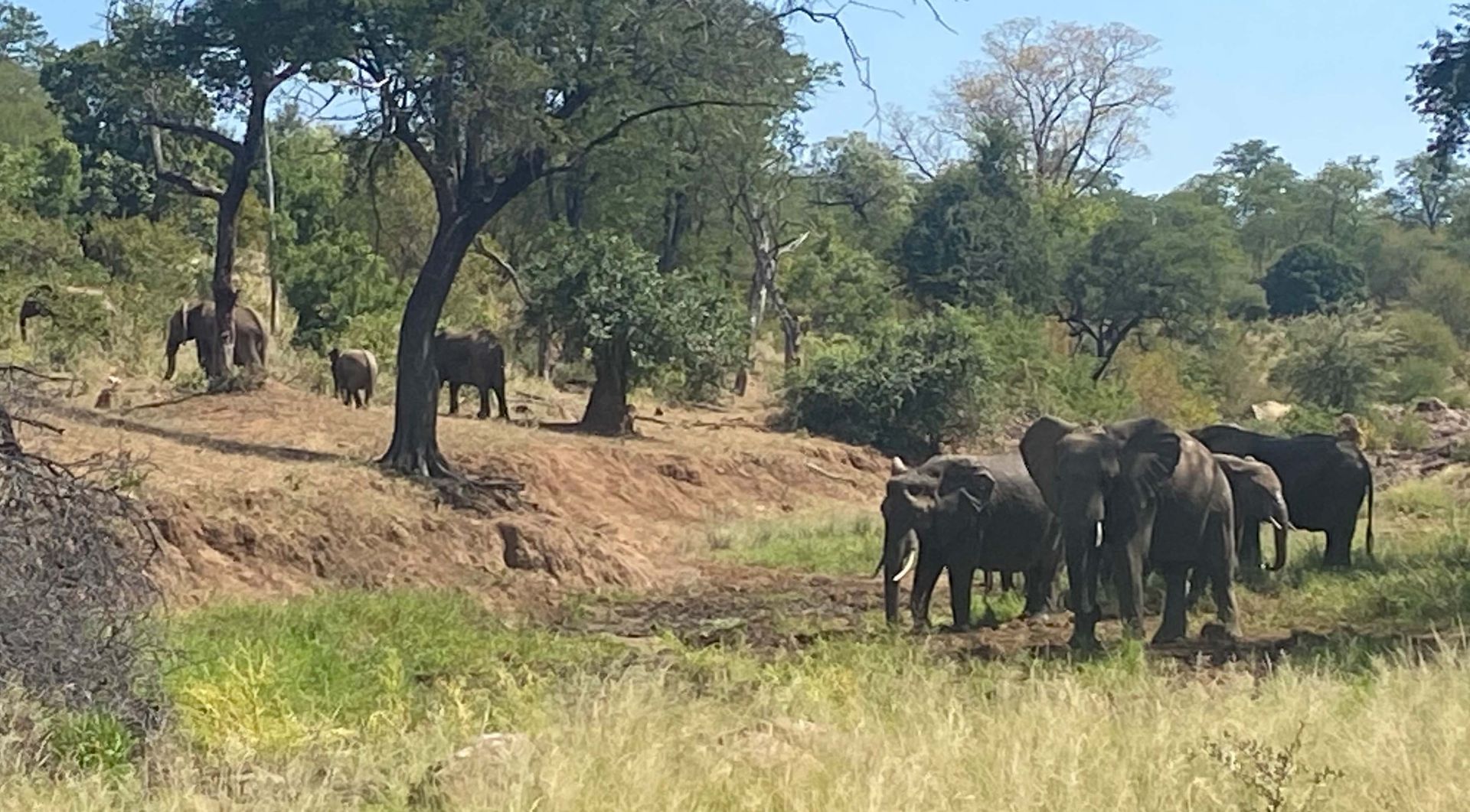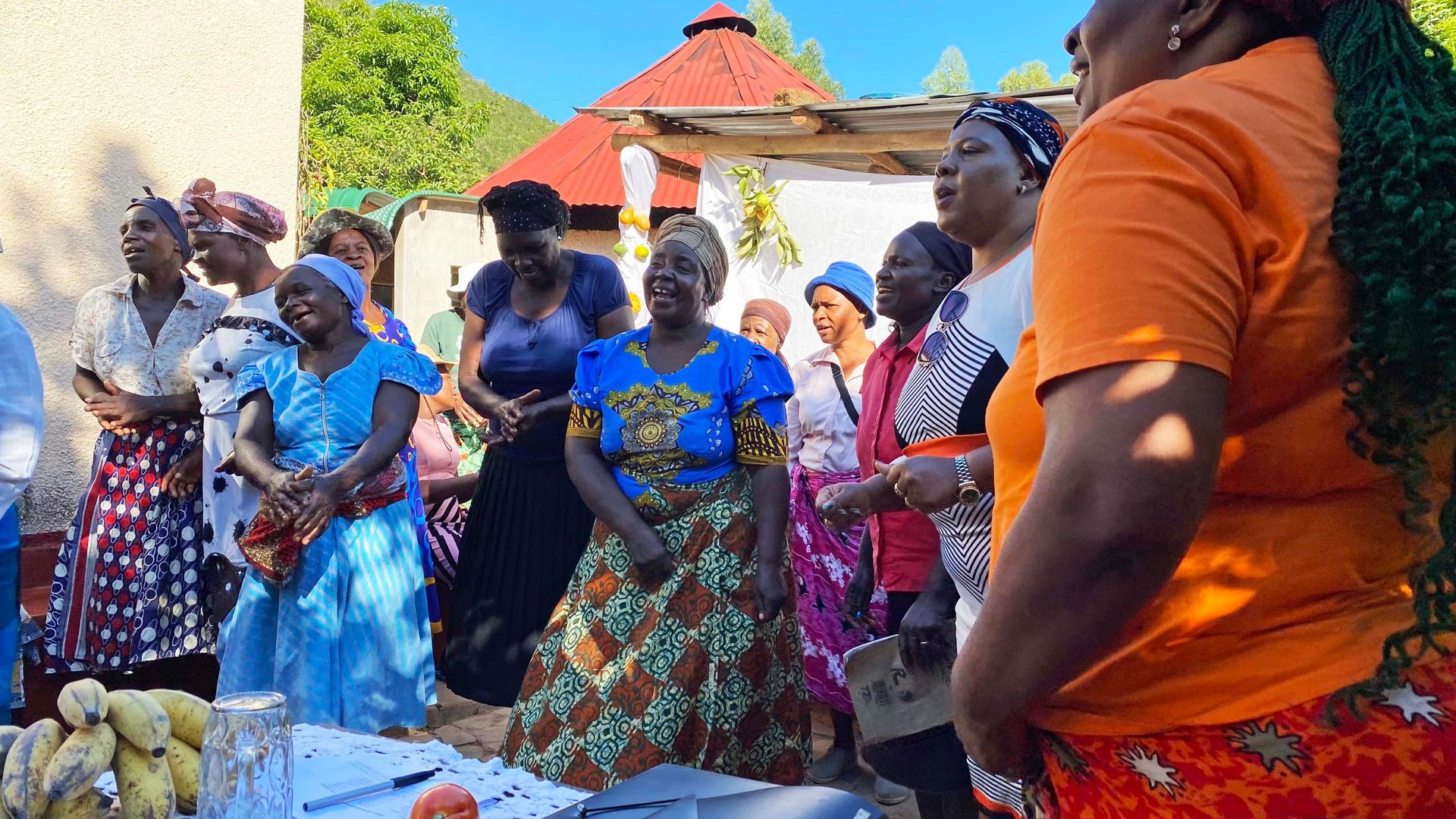Magazine
Magazine
Project trip to Zimbabwe
Project trip to Zimbabwe
Project trip to Zimbabwe
Visit to the projects of Chiedza Chenyika Organization
Visit to the projects of Chiedza Chenyika Organization
Visit to the projects of Chiedza Chenyika Organization
Markus Schopp (KETAAKETI country coordinator for Zimbabwe) travels to Zimbabwe with his wife Sabine in April 2024. He describes his experiences during the project trip in a personal report:
13.04.2024, Bulawayo, Zimbabwe:
"Just 30 minutes after leaving the plane, we see the first unmistakable signs from the car that we are in Africa: small market stalls more or less close to the roadside, lots of people walking from A to B, cows and goats grazing on the side of the road regardless of the traffic, overloaded ancient trucks, women hurrying to the stopped intercity bus to sell food to the bus passengers from baskets balanced on their heads, and lots of children in school uniforms. And yet something is different, although this "different" does not refer to a clearly identifiable visual impression, but rather arises from a diffuse feeling. And then we name this feeling almost simultaneously: the atmosphere here seems more relaxed, more calm than we have felt in other African countries. A smile or a friendly word everywhere. We will probably feel at home here in Zimbabwe.
Maybe it's different in Harare, but here in Bulawayo, the second largest city in the country with 1.2 million inhabitants, there is no sign of hectic activity, traffic chaos or aggression. In total, Zimbabwe is home to 15.5 million people, of whom almost 100,000 are white. In an area of 391,000 square kilometers, the population density is significantly lower (42/square kilometer) than we are used to in Germany (238). As a result, the country appears almost deserted in places on our journey east."
Markus Schopp (KETAAKETI country coordinator for Zimbabwe) travels to Zimbabwe with his wife Sabine in April 2024. He describes his experiences during the project trip in a personal report:
13.04.2024, Bulawayo, Zimbabwe:
"Just 30 minutes after leaving the plane, we see the first unmistakable signs from the car that we are in Africa: small market stalls more or less close to the roadside, lots of people walking from A to B, cows and goats grazing on the side of the road regardless of the traffic, overloaded ancient trucks, women hurrying to the stopped intercity bus to sell food to the bus passengers from baskets balanced on their heads, and lots of children in school uniforms. And yet something is different, although this "different" does not refer to a clearly identifiable visual impression, but rather arises from a diffuse feeling. And then we name this feeling almost simultaneously: the atmosphere here seems more relaxed, more calm than we have felt in other African countries. A smile or a friendly word everywhere. We will probably feel at home here in Zimbabwe.
Maybe it's different in Harare, but here in Bulawayo, the second largest city in the country with 1.2 million inhabitants, there is no sign of hectic activity, traffic chaos or aggression. In total, Zimbabwe is home to 15.5 million people, of whom almost 100,000 are white. In an area of 391,000 square kilometers, the population density is significantly lower (42/square kilometer) than we are used to in Germany (238). As a result, the country appears almost deserted in places on our journey east."
Markus Schopp (KETAAKETI country coordinator for Zimbabwe) travels to Zimbabwe with his wife Sabine in April 2024. He describes his experiences during the project trip in a personal report:
13.04.2024, Bulawayo, Zimbabwe:
"Just 30 minutes after leaving the plane, we see the first unmistakable signs from the car that we are in Africa: market small stalls more or less close to the roadside, lots of people walking from A to B, cows and goats grazing on the side of the road regardless of the traffic, overloaded ancient trucks, women hurrying to the stopped intercity bus to sell food to the bus passengers from baskets balanced on their heads, and lots of children in school uniforms. And yet something is different, although this "different" does not refer to a clearly identifiable visual impression, but rather arises from a diffuse feeling. And then we name this feeling almost simultaneously: the atmosphere here seems more relaxed, more calm than we have felt in other African countries. A smile or a friendly word everywhere. We will probably feel at home here in Zimbabwe.
Maybe it's different in Harare, but here in Bulawayo, the second largest city in the country with 1.2 million inhabitants, there is no sign of hectic activity, traffic chaos or aggression. In total, Zimbabwe is home to 15.5 million people, of whom almost 100,000 are white. In an area of 391,000 square kilometers, the population density is significantly lower (42/square kilometer) than we are used to in Germany (238). As a result, the country appears almost deserted in places on our journey east."
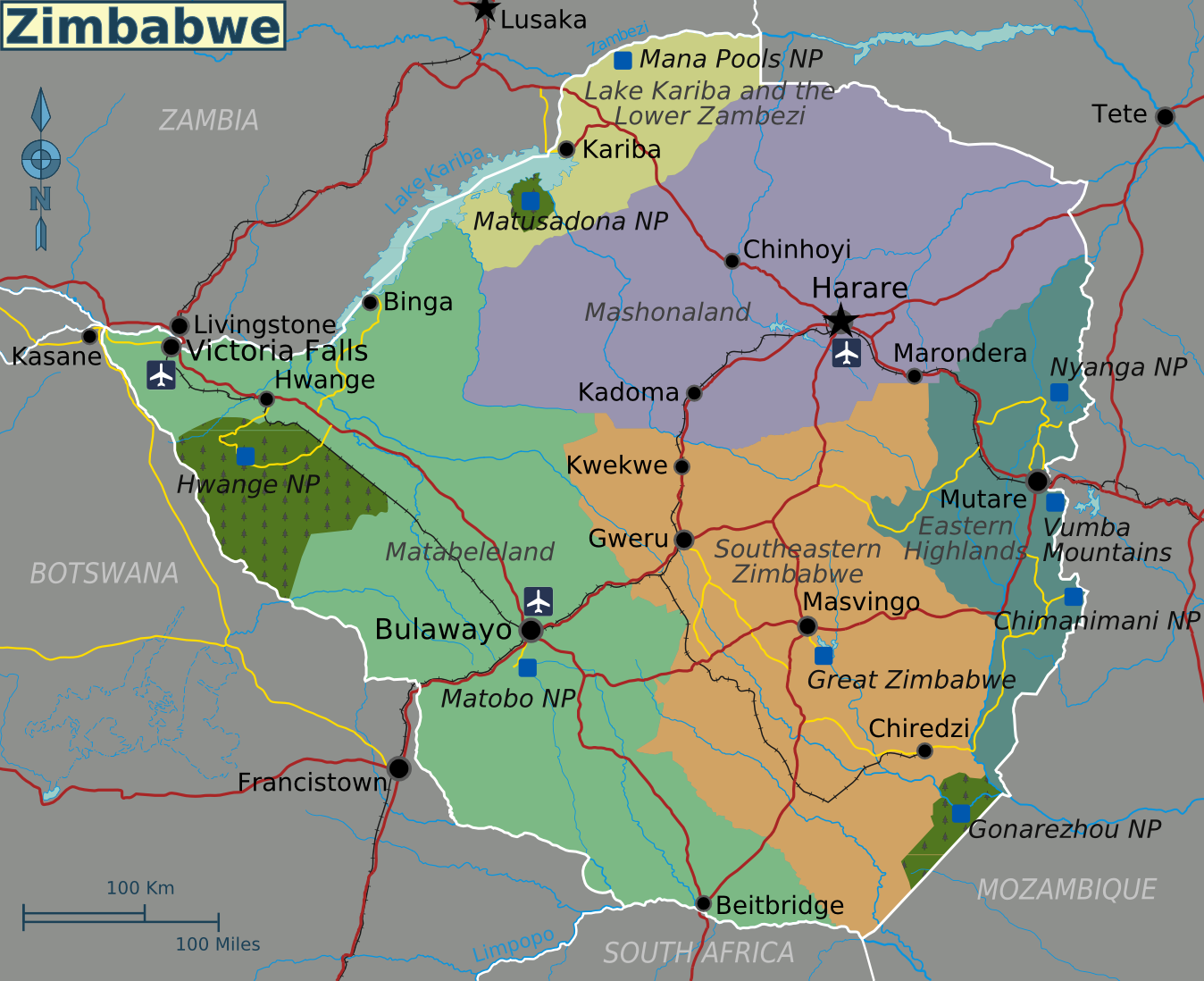
Zimbabwe is a landlocked country in southern Africa and is about the size of Germany and Denmark combined. It has a tropical climate with alternating humid climates, which is temperate on the prevailing high plateaus. The rainy season is from November to March, and it is somewhat cooler from May to August, i.e. the "winter" of the southern hemisphere: in the capital Harare, which is 1480 m above sea level, the average temperature in June and July is only 13°C.
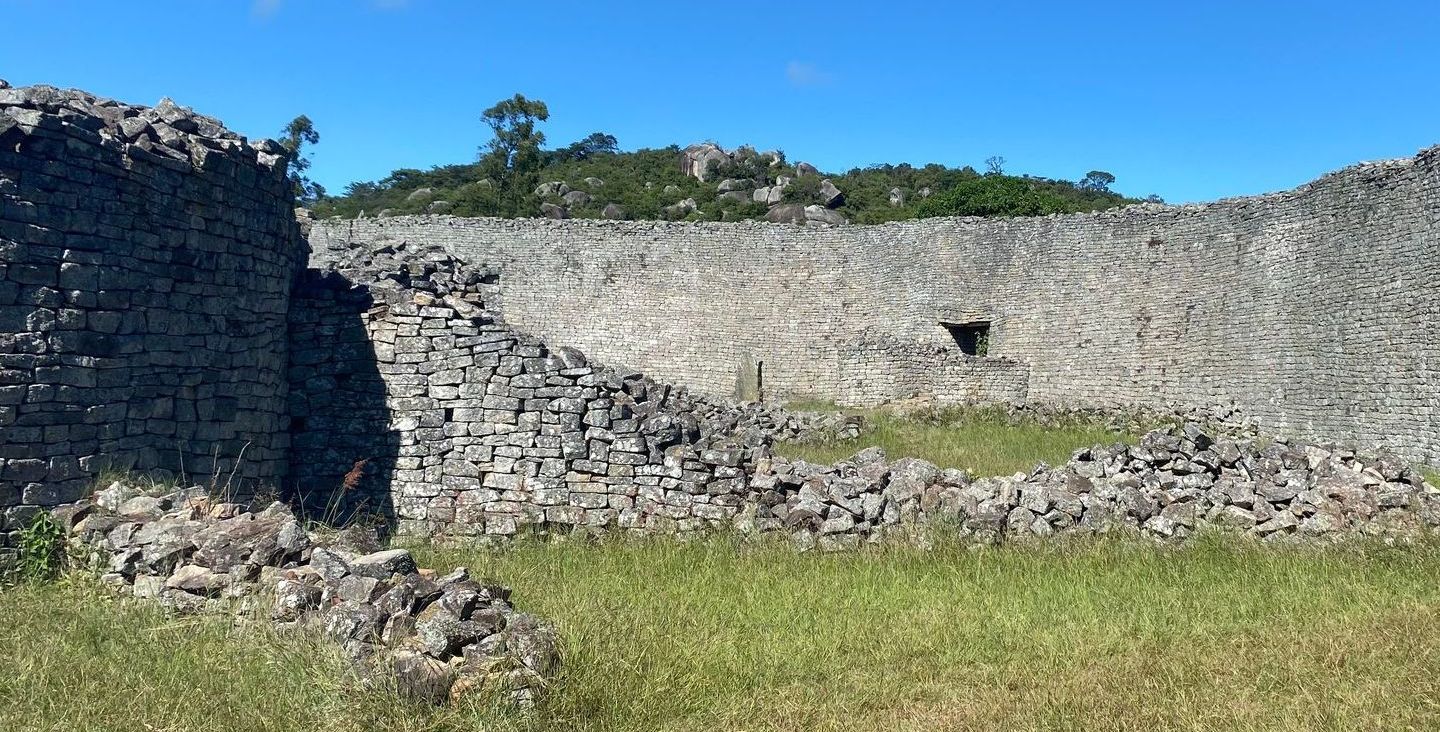
"Great Zimbabwe": Historic sites from which a prosperous kingdom was ruled from 1180 to 1600 AD.
Zimbabwe
In 2017, long-time ruler Robert Mugabe was deposed by the military after 37 years in office. After the current president, E. Mnangagwa, came to power, the country is still in a deep crisis, and human rights violations are the order of the day. Today, Zimbabwe, which was still recognized in the 1980s for its good level of education and social and economic success, is one of the poorest countries in the world. In terms of the Human Development Index (HDI), the country ranks 146th out of a total of 189 countries.
In the former breadbasket of Africa, there are increasing supply crises. Climate change is reflected in increasingly frequent floods and droughts, such as in 2019 and 2021. A land reform in 2000-2003, which had catastrophic economic effects, has also meant that the country can no longer feed itself. Due to the brutal expropriation and persecution of white farmers, Zimbabwe became increasingly isolated in terms of foreign policy and, in addition to political mistakes in the country, the willingness to invest from abroad also decreased. Capital flight and deindustrialization had a devastating effect.
That is why a political turnaround is now taking place: around 3,500 formerly expropriated white farmers are now to be compensated with $850,000 per head. Money that the state does not actually have. The economic crisis is taking on increasingly threatening proportions, the currency is in free fall.

Zimbabwe is a landlocked country in southern Africa and is about the size of Germany and Denmark combined. It has a tropical climate with alternating humid climates, which is temperate on the prevailing high plateaus. The rainy season is from November to March, and it is somewhat cooler from May to August, i.e. the "winter" of the southern hemisphere: in the capital Harare, which is 1480 m above sea level, the average temperature in June and July is only 13°C.

"Great Zimbabwe": Historic sites from which a prosperous kingdom was ruled from 1180 to 1600 AD.
Zimbabwe
In 2017, long-time ruler Robert Mugabe was deposed by the military after 37 years in office. After the current president, E. Mnangagwa, came to power, the country is still in a deep crisis, and human rights violations are the order of the day. Today, Zimbabwe, which was still recognized in the 1980s for its good level of education and social and economic success, is one of the poorest countries in the world. In terms of the Human Development Index (HDI), the country ranks 146th out of a total of 189 countries.
In the former breadbasket of Africa, there are increasing supply crises. Climate change is reflected in increasingly frequent floods and droughts, such as in 2019 and 2021. A land reform in 2000-2003, which had catastrophic economic effects, has also meant that the country can no longer feed itself. Due to the brutal expropriation and persecution of white farmers, Zimbabwe became increasingly isolated in terms of foreign policy and, in addition to political mistakes in the country, the willingness to invest from abroad also decreased. Capital flight and deindustrialization had a devastating effect.
That is why a political turnaround is now taking place: around 3,500 formerly expropriated white farmers are now to be compensated with $850,000 per person. Money that the state does not actually have. The economic crisis is taking on increasingly threatening proportions, the currency is in free fall.

Zimbabwe is a landlocked country in southern Africa and is about the size of Germany and Denmark combined. It has a tropical climate with alternating humid climates, which is temperate on the prevailing high plateaus. The rainy season is from November to March, and it is somewhat cooler from May to August, i.e. the "winter" of the southern hemisphere: in the capital Harare, which is 1480 m above sea level, the average temperature in June and July is only 13°C.

"Great Zimbabwe": Historic sites from which a prosperous kingdom was ruled from 1180 to 1600 AD.
Zimbabwe
In 2017, long-time ruler Robert Mugabe was deposed by the military after 37 years in office. After the current president, E. Mnangagwa, came to power, the country is still in a deep crisis, and human rights violations are the order of the day. Today, Zimbabwe, which was still recognized in the 1980s for its good level of education and social and economic success, is one of the poorest countries in the world. In terms of the Human Development Index (HDI), the country ranks 146th out of a total of 189 countries.
In the former breadbasket of Africa, there are increasing supply crises. Climate change is reflected in increasingly frequent floods and droughts, such as in 2019 and 2021. A land reform in 2000-2003, which had catastrophic economic effects, has also meant that the country can no longer feed itself. Due to the brutal expropriation and persecution of white farmers, Zimbabwe became increasingly isolated in terms of foreign policy and, in addition to political mistakes in the country, the willingness to invest from abroad also decreased. Capital flight and deindustrialization had a devastating effect.
That is why a political turnaround is now taking place: around 3,500 formerly expropriated white farmers are now to be compensated with $850,000 per person. Money that the state does not actually have. The economic crisis is taking on increasingly threatening proportions, the currency is in free fall.
Get to know the project partners personally
Get to know the project partners personally
Get to know the project partners personally
"We are warmly welcomed at the airport in the capital Harare by two employees of the Chiedza Chenyika Organization. The car ride to the house of Adeyline, the head of our partner organization, takes forever in the rush hour traffic of the capital. Traffic rules are understood as suggestions, at intersections with non-functioning traffic lights you somehow muddle through - welcome to an African metropolis!
When we arrived at our hosts' house, the 15-year-old daughter showed us our guest room, then we had the typical meal here: chicken legs with sassa (maize porridge) and vegetables. The host, a successful businessman, said goodbye soon after the meal, and Adeyline discussed the planned schedule for the next few days with us.
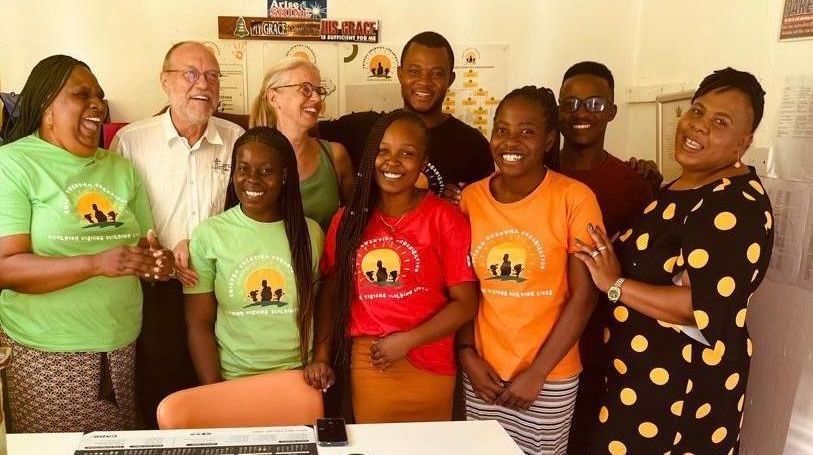
The entire team of the Chiedza Chenyika Organization (on the right the director, Adeyline Dzumbira) and in the background the two visitors from Germany
So the next morning we met Innocent, the project manager. It's a strange feeling to suddenly be able to hug someone in person who you've spoken to so many times on the phone or in video conferences."
"We are warmly welcomed at the airport in the capital Harare by two employees of the Chiedza Chenyika Organization. The car ride to the house of Adeyline, the head of our partner organization, takes forever in the rush hour traffic of the capital. Traffic rules are understood as suggestions, at intersections with non-functioning traffic lights you somehow muddle through - welcome to an African metropolis!
When we arrived at our hosts' house, the 15-year-old daughter showed us our guest room, then we had the typical meal here: chicken legs with sassa (maize porridge) and vegetables. The host, a successful businessman, said goodbye soon after the meal, and Adeyline discussed the planned schedule for the next few days with us.

The entire team of the Chiedza Chenyika Organization (on the right the director, Adeyline Dzumbira) and in the background the two visitors from Germany
So the next morning we met Innocent, the project manager. It's a strange feeling to suddenly be able to hug someone in person who you've spoken to so many times on the phone or in video conferences."
"We are warmly welcomed at the airport in the capital Harare by two employees of the Chiedza Chenyika Organization. The car ride to the house of Adeyline, the head of our partner organization, takes forever in the rush hour traffic of the capital. Traffic rules are understood as suggestions, at intersections with non-functioning traffic lights you somehow muddle through - welcome to an African metropolis!
When we arrived at our hosts' house, the 15-year-old daughter showed us our guest room, then we had the typical meal here: chicken legs with sassa (maize porridge) and vegetables. The host, a successful businessman, said goodbye soon after the meal, and Adeyline discussed the planned schedule for the next few days with us.

The entire team of the Chiedza Chenyika Organization (on the right the director, Adeyline Dzumbira) and in the background the two visitors from Germany
So the next morning we met Innocent, the project manager. It's a strange feeling to suddenly be able to hug someone in person who you've spoken to so many times on the phone or in video conferences."
Visit to the German Ambassador
Visit to the German Ambassador
Visit to the German Ambassador
"The rest of the team has already arrived at our first planned project village to conduct a training session there. Adeyline, Innocent, Sabine and I have a meeting with the German ambassador in Harare on the agenda. The conversation with the ambassador is very nice and informative, although we naturally spoke in English out of consideration for our African friends. Our impressions gained during the trip to the south of the country were confirmed; the ambassador described the people in his host country as remarkably friendly, creative and hardworking.
Zimbabwe does not receive any funds from German development cooperation; at least the sanctions imposed after the disastrous land reform of former President Robert Mugabe have largely been lifted, partly because Zimbabwe has committed to compensating the white farmers who were expropriated in 2000.
We also learn that the country loses billions of euros in revenue every year due to smuggling of gold and other valuable metals mined in the country.
Of course, we have the opportunity to present the work of KETAAKETI and Chiedza Chenyika in detail. At the end, business cards, flyers and the like are exchanged, the embassy's small project funding program is discussed, and after an hour we leave the embassy again through the high-security portal. We German visitors are now delighted to finally be able to meet the people supported by the KETAAKETI model."
"The rest of the team has already arrived at our first planned project village to conduct a training session there. Adeyline, Innocent, Sabine and I have a meeting with the German ambassador in Harare on the agenda. The conversation with the ambassador is very nice and informative, although we naturally spoke in English out of consideration for our African friends. Our impressions gained during the trip to the south of the country were confirmed; the ambassador described the people in his host country as remarkably friendly, creative and hardworking.
Zimbabwe does not receive any funds from German development cooperation; at least the sanctions imposed after the disastrous land reform of former President Robert Mugabe have largely been lifted, partly because Zimbabwe has committed to compensating the white farmers who were expropriated in 2000.
We also learn that the country loses billions of euros in revenue every year due to smuggling of gold and other valuable metals mined in the country.
Of course, we have the opportunity to present the work of KETAAKETI and Chiedza Chenyika in detail. At the end, business cards, flyers and the like are exchanged, the embassy's small project funding program is discussed, and after an hour we leave the embassy again through the high-security portal. We German visitors are now delighted to finally be able to meet the people supported by the KETAAKETI model."
"The rest of the team has already arrived at our first planned project village to conduct a training session there. Adeyline, Innocent, Sabine and I have a meeting with the German ambassador in Harare on the agenda. The conversation with the ambassador is very nice and informative, although we naturally spoke in English out of consideration for our African friends. Our impressions gained during the trip to the south of the country were confirmed; the ambassador described the people in his host country as remarkably friendly, creative and hardworking.
Zimbabwe does not receive any funds from German development cooperation; at least the sanctions imposed after the disastrous land reform of former President Robert Mugabe have largely been lifted, partly because Zimbabwe has committed to compensating the white farmers who were expropriated in 2000.
We also learn that the country loses billions of euros in revenue every year due to smuggling of gold and other valuable metals mined in the country.
Of course, we have the opportunity to present the work of KETAAKETI and Chiedza Chenyika in detail. At the end, business cards, flyers and the like are exchanged, the embassy's small project funding program is discussed, and after an hour we leave the embassy again through the high-security portal. We German visitors are now delighted to finally be able to meet the people supported by the KETAAKETI model."
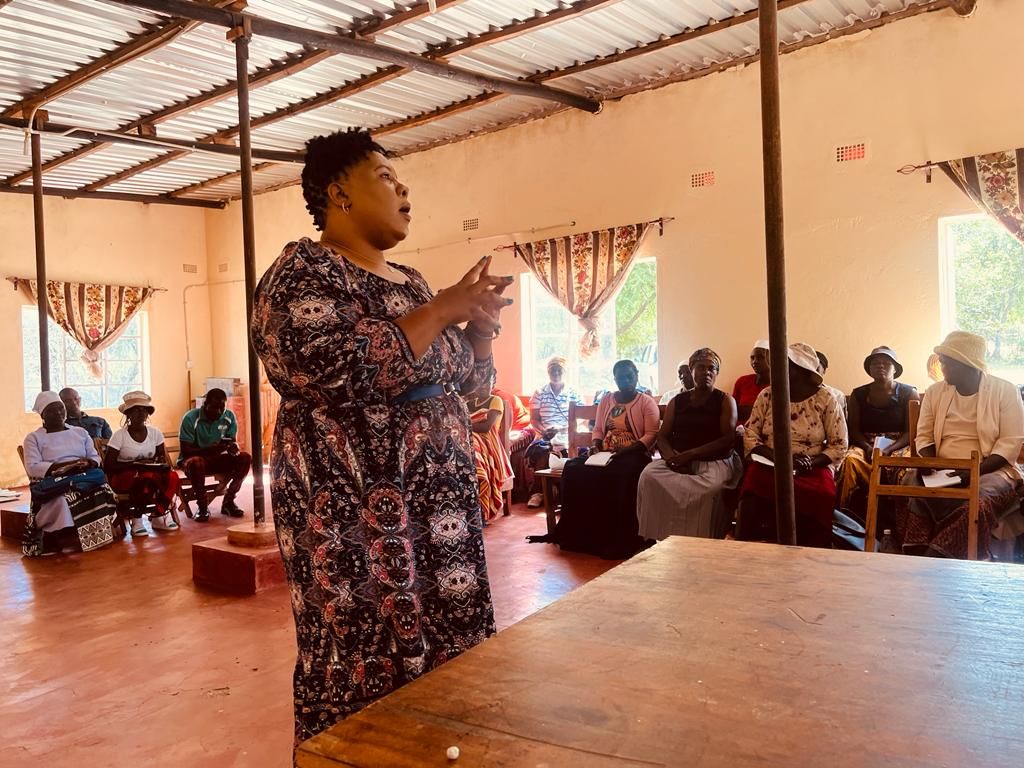
Adeyline Dzumbira, NGO-leader of the Chiedza Chenyika Organization
“Consistent with both local and global trends, I represent the plight of vulnerable and historically marginalised populations in our Zimbabwean societies; namely children, women and the youth. My desire is, first and foremost, to ensure that they enjoy their different rights as enshrined in our Zimbabwe Constitution. In protecting and advancing their rights, I seek to empower them through educational and entrepreneurship support, among other interventions. The ultimate goal is to create a healthy, equal and just society where everyone's dormant potentialities are activated for the normal functioning of society."

Adeyline Dzumbira, NGO-leader of the Chiedza Chenyika Organization
“Consistent with both local and global trends, I represent the plight of vulnerable and historically marginalised populations in our Zimbabwean societies; namely children, women and the youth. My desire is, first and foremost, to ensure that they enjoy their different rights as enshrined in our Zimbabwe Constitution. In protecting and advancing their rights, I seek to empower them through educational and entrepreneurship support, among other interventions. The ultimate goal is to create a healthy, equal and just society where everyone's dormant potentialities are activated for the normal functioning of society."

Adeyline Dzumbira, NGO leader of the Chiedza Chenyika Organization
“Consistent with both local and global trends, I represent the plight of vulnerable and historically marginalised populations in our Zimbabwean societies; namely children, women and the youth. My desire is, first and foremost, to ensure that they enjoy their different rights as enshrined in our Zimbabwe Constitution. In protecting and advancing their rights, I seek to empower them through educational and entrepreneurship support, among other interventions. The ultimate goal is to create a healthy, equal and just society where everyone's dormant potentialities are activated for the normal functioning of society."
Warmest welcome for the visitors
Warmest welcome for the visitors
Warmest welcome for the visitors
"And then something happens that turns out to be a pattern for all our project visits in the coming days. As representatives of KETAAKETI, we are given places of honor in the prepared and partly lovingly decorated meeting place. In one village, we are allowed to admire chickens and two pigs that 13 women bought together with microfinance money. Now the ladies are waiting for offspring, after all, the microfinance is to be paid back and two small piglets are to be the property of the village and "earn" the children's school fees in the future."
"And then something happens that turns out to be a pattern for all our project visits in the coming days. As representatives of KETAAKETI, we are given places of honor in the prepared and partly lovingly decorated meeting place. In one village, we are allowed to admire chickens and two pigs that 13 women bought together using microfinance money. Now the ladies are waiting for offspring, after all, the microfinance is to be paid back and two small piglets are to be the property of the village and "earn" the children's school fees in the future."
"And then something happens that turns out to be a pattern for all our project visits in the coming days. As representatives of KETAAKETI, we are given places of honor in the prepared and partly lovingly decorated meeting place. In one village, we are allowed to admire chickens and two pigs that 13 women bought together using microfinance money. Now the ladies are waiting for offspring, after all, the microfinance is to be paid back and two small piglets are to be the property of the village and "earn" the children's school fees in the future."
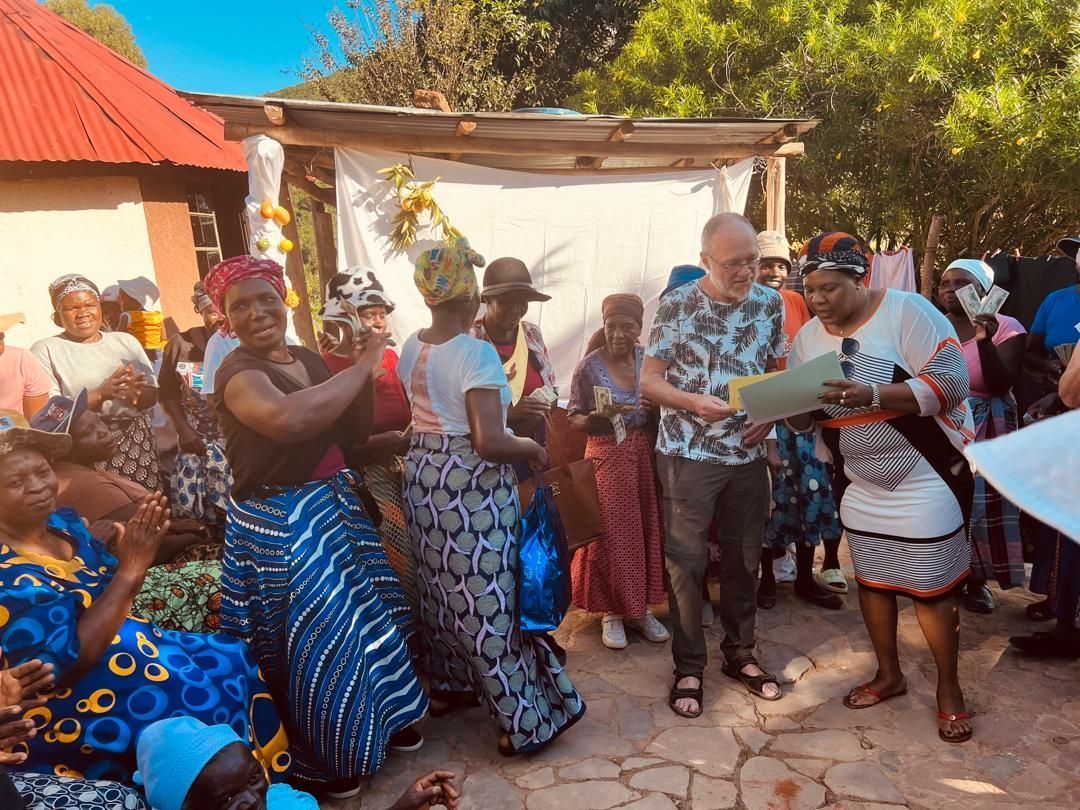
The women who have successfully improved their lives with microfinance is given a certificate and a small gift to motivate them further. The guest Markus Schopp has the honour of receiving these gifts from the Chiedza Chenyika Organization to the women.
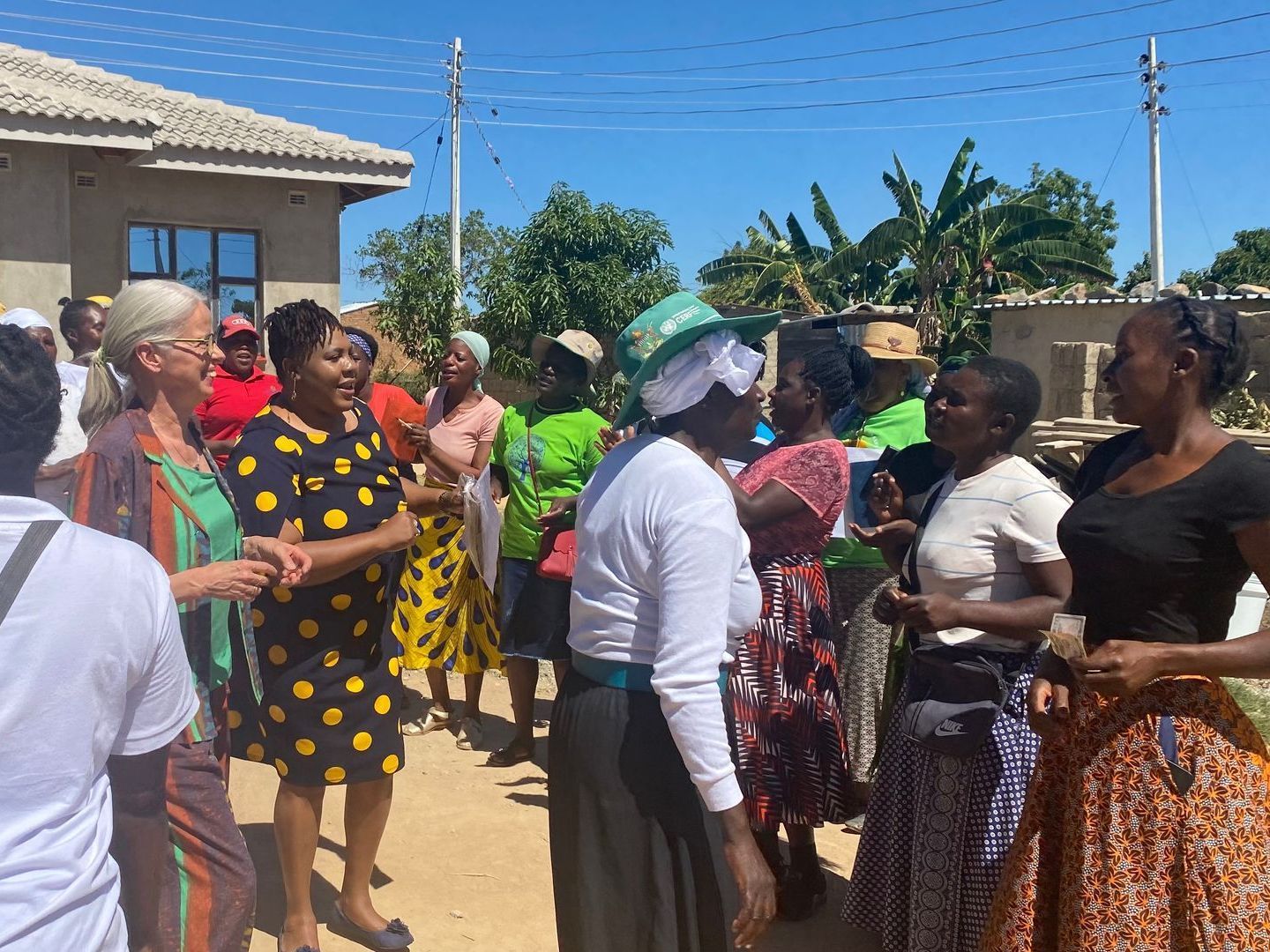
Good mood at the reception in a village where new microfinance projects are being launched.

The women who have successfully improved their lives with microfinance is given a certificate and a small gift to motivate them further. Guest Markus Schopp has the honor of presenting these gifts to the women from the Chiedza Chenyika Organization.

Good mood at the reception in a village where new microfinance projects are being launched.

The women who have successfully improved their lives with microfinance is given a certificate and a small gift to motivate them further. The guest Markus Schopp has the honour of receiving these gifts from the Chiedza Chenyika Organization to the women.

Good mood at the reception in a village where new microfinance projects are being launched.
"But after properly admiring the pigs and their pens, it's time to go to the places of honor. Sometimes there's coffee, sometimes juice, sometimes homemade little cakes, sometimes a whole dinner. In the end, we never stay in these places of honor for long, but after a very short time we find ourselves singing, dancing, cheering and rejoicing over successfully completed or newly received start-up loans."
"But after properly admiring the pigs and their pens, it's time to go to the places of honor. Sometimes there's coffee, sometimes juice, sometimes homemade little cakes, sometimes a whole dinner. In the end, we never stay in these places of honor for long, but after a very short time we find ourselves singing, dancing, cheering and rejoicing over successfully completed or newly received start-up loans."
"But after properly admiring the pigs and their pens, it's time to go to the places of honor. Sometimes there's coffee, sometimes juice, sometimes homemade little cakes, sometimes a whole dinner. In the end, we never stay in these places of honor for long, but after a very short time we find ourselves singing, dancing, cheering and rejoicing over successfully completed or newly received start-up loans."
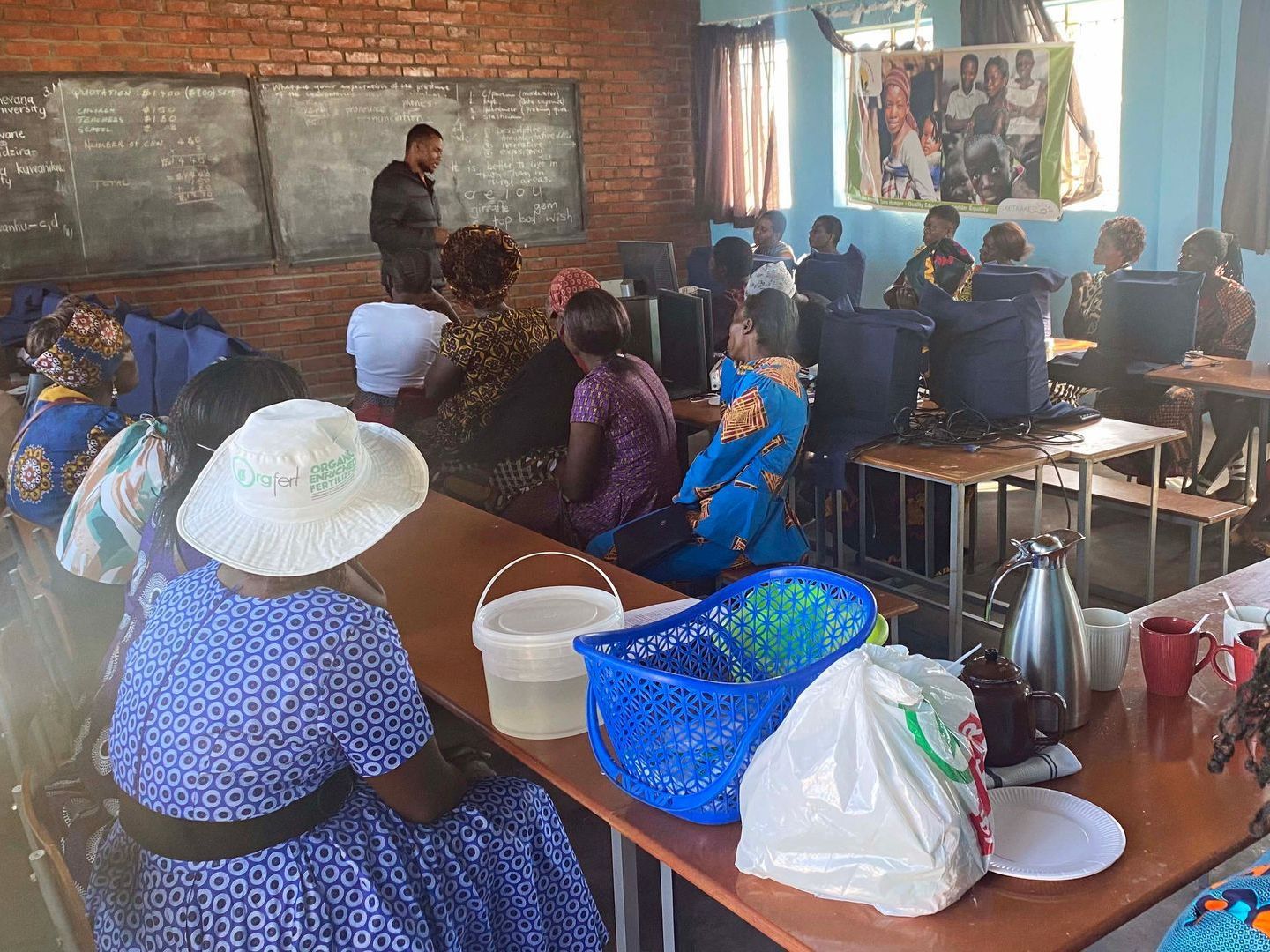
In the village school building, project manager Innocent Dube explains to the assembled women once again the basic principles of financial management: saving, budgeting, etc., so that the microfinance received is used well.
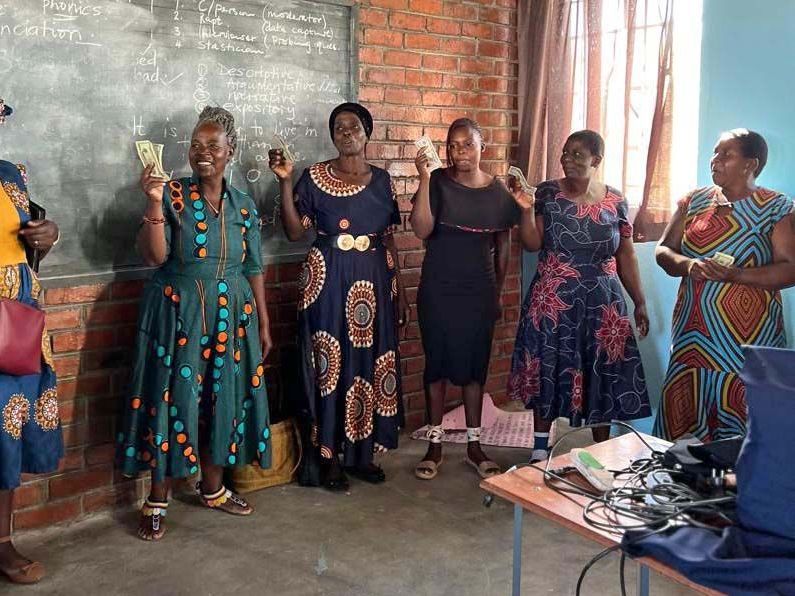
10 women from the village each received €100, which they now want to use to significantly improve their lives.

In the village school building, project manager Innocent Dube explains to the assembled women once again the basic principles of financial management: saving, budgeting, etc., so that the microfinance received is used well.

10 women from the village each received €100, which they now want to use to significantly improve their lives.

In the village school building, project manager Innocent Dube explains to the assembled women once again the basic principles of financial management: saving, budgeting, etc., so that the microfinance received is used well.

10 women from the village each received €100, which they now want to use to significantly improve their lives.
The principle of "Headwomen"
The principle of "Headwomen"
The principle of "Headwomen"
"For us, the high point of the loan cycle is of course celebrated: the women who have managed to pay back their loan are allowed to report what they did with the 100 euros and are rewarded with lots of applause, a certificate and a small gift. Then the next women receive this money and explain what they plan to do next. In this context, the principles of money management that have already been discussed in more detailed training sessions are mentioned again; budgets, spending controls, reserves and generally responsible management are discussed.
The new groups of ten will choose a "headwoman" from among themselves who will be responsible for contact with Chiedza Chenyika over the coming months and will also be responsible for collecting the loan repayments. This is a position that requires a great deal of trust, both from the borrowers and from the organization. We are discussing the possibility of more extensive training for these "headwomen" and promise to take the topic back to Germany for internal KETAAKETI discussions."
"For us, the high point of the loan cycle is of course celebrated: the women who have managed to pay back their loan are allowed to report what they did with the 100 euros and are rewarded with lots of applause, a certificate and a small gift. Then the next women receive this money and explain what they plan to do next. In this context, the principles of money management that have already been discussed in more detailed training sessions are mentioned again; budgets, spending controls, reserves and generally responsible management are discussed.
The new groups of ten will choose a "headwoman" from among themselves who will be responsible for contact with Chiedza Chenyika over the coming months and will also be responsible for collecting the loan repayments. This is a position that requires a great deal of trust, both from the borrowers and from the organization. We are discussing the possibility of more extensive training for these "headwomen" and promise to take the topic back to Germany for internal KETAAKETI discussions."
"For us, the high point of the loan cycle is of course celebrated: the women who have managed to pay back their loan are allowed to report what they did with the 100 euros and are rewarded with lots of applause, a certificate and a small gift. Then the next women receive this money and explain what they plan to do next. In this context, the principles of money management that have already been discussed in more detailed training sessions are mentioned again; budgets, spending controls, reserves and generally responsible management are discussed.
The new groups of ten will choose a "headwoman" from among themselves who will be responsible for contact with Chiedza Chenyika over the coming months and will also be responsible for collecting the loan repayments. This is a position that requires a great deal of trust, both from the borrowers and from the organization. We are discussing the possibility of more extensive training for these "headwomen" and promise to take the topic back to Germany for internal KETAAKETI discussions."

Road to the village of Mutasa in the eastern highlands of Zimbabwe - difficult to navigate in the dry season, impassable in the rainy season

The women of the village welcome visitors with song and dance.

The road to the village of Mutasa in the eastern highlands of Zimbabwe - difficult to navigate in the dry season, impassable in the rainy season

The women of the village welcome visitors with song and dance.

The road to the village of Mutasa in the eastern highlands of Zimbabwe - difficult to navigate in the dry season, impassable in the rainy season

The women of the village welcome visitors with song and dance.
"Of course there are villages where things are not going so well at the moment because of conflicts with the "community leaders" appointed by the government, there are villages where the projects are just running quietly, and there is DC Mutasa, this village in the mountains of the eastern highlands that is almost inaccessible even in dry weather via a sand, gravel and rock track, where we are showered with so much love that we hardly know how to deal with it. The reception, as soon as the women see our car, with singing, dancing and hugs, is hard to beat in terms of warmth."
"Of course there are villages where things are not going so well at the moment because of conflicts with the "community leaders" appointed by the government, there are villages where the projects are just running quietly, and there is DC Mutasa, this village in the mountains of the eastern highlands that is almost inaccessible even in dry weather via a sand, gravel and rock track, where we are showered with so much love that we hardly know how to deal with it. The reception, as soon as the women see our car, with singing, dancing and hugs, is hard to beat in terms of warmth."
"Of course there are villages where things are not going so well at the moment because of conflicts with the "community leaders" appointed by the government, there are villages where the projects are just running quietly, and there is DC Mutasa, this village in the mountains of the eastern highlands that is almost inaccessible even in dry weather via a sand, gravel and rock track, where we are showered with so much love that we hardly know how to deal with it. The reception, as soon as the women see our car, with singing, dancing and hugs, is hard to beat in terms of warmth."

Four women from the village have put together a short play and are now performing it for the other women in the village and visitors. The play explains the principles of interest-free microfinance with sharing.
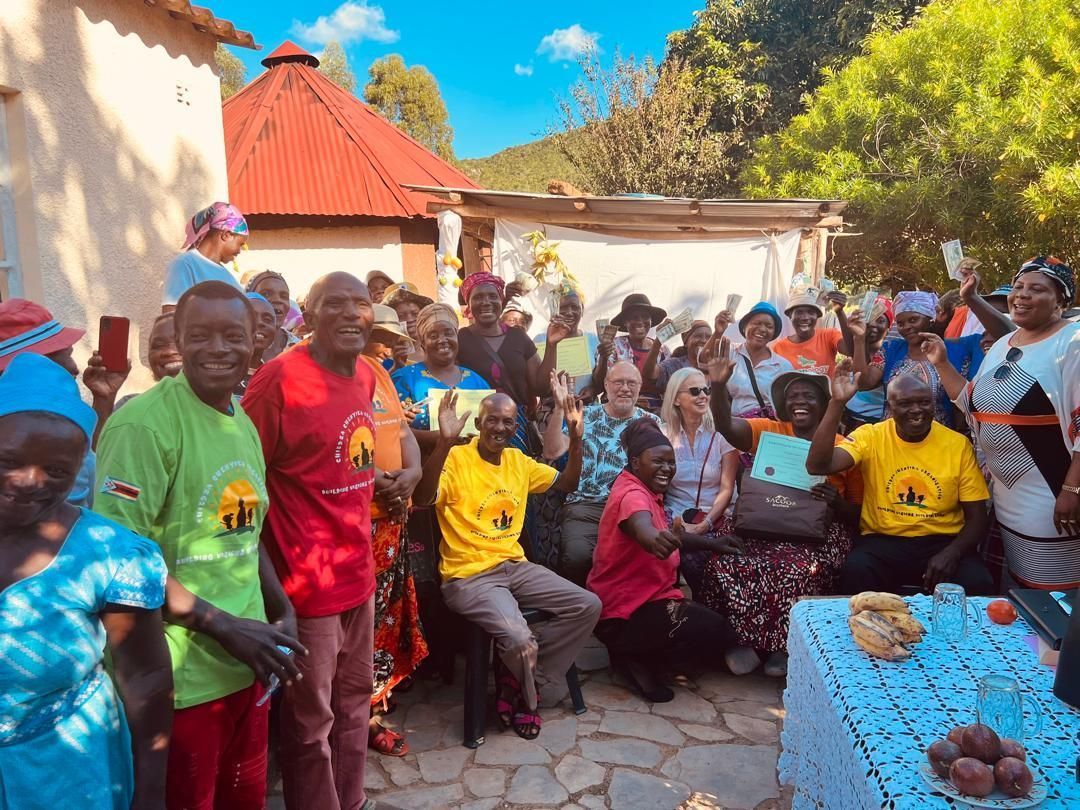
At the end of the visit to the village, the men and the elders also come together for a group photo.

Four women from the village have put together a short play and are now performing it for the other women in the village and visitors. The play explains the principles of interest-free microfinance with sharing.

At the end of the visit to the village, the men and the elders also come together for a group photo.

Four women from the village have put together a short play and are now performing it for the other women in the village and visitors. The play explains the principles of interest-free microfinance with sharing.

At the end of the visit to the village, the men and the elders also come together for a group photo.
"Then we see that there are also several men present who also greet us in a friendly manner.
Later we dare to ask. Yes, there were conflicts between the women, who had become more self-confident thanks to their economic success, and their husbands, who wanted to remain in the role of pasha, but that was over now, the men had realized that a wife who brought money home was not so bad after all. Some of the women presented this whole development in a short play to everyone's delight. How the news of the interest-free start-up loan spreads, how the husband (who is of course portrayed drunk) finally understands what his wife is doing and why she is so self-confident, all of this is presented in a heartwarming way and is met with wild applause and singing. Then the certificates are awarded here too, while some of the women are already busy cooking for the guests (chicken legs with sassa and vegetables). The men also join in for the final group photo."
"Then we see that there are also several men present who also greet us in a friendly manner.
Later we dare to ask. Yes, there were conflicts between the women, who had become more self-confident thanks to their economic success, and their husbands, who wanted to remain in the role of pasha, but that was over now, the men had realized that a wife who brought money home was not so bad after all. Some of the women presented this whole development in a short play to everyone's delight. How the news of the interest-free start-up loan spreads, how the husband (who is of course portrayed drunk) finally understands what his wife is doing and why she is so self-confident, all of this is presented in a heartwarming way and is met with wild applause and singing. Then the certificates are awarded here too, while some of the women are already busy cooking for the guests (chicken legs with sassa and vegetables). The men also join in for the final group photo."
"Then we see that there are also several men present who also greet us in a friendly manner.
Later we dare to ask. Yes, there were conflicts between the women, who had become more self-confident thanks to their economic success, and their husbands, who wanted to remain in the role of pasha, but that was over now, the men had realized that a wife who brought money home was not so bad after all. Some of the women presented this whole development in a short play to everyone's delight. How the news of the interest-free start-up loan spreads, how the husband (who is of course portrayed drunk) finally understands what his wife is doing and why she is so self-confident, all of this is presented in a heartwarming way and is met with wild applause and singing. Then the certificates are awarded here too, while some of the women are already busy cooking for the guests (chicken legs with sassa and vegetables). The men also join in for the final group photo."
More Magazine article
More Magazine article
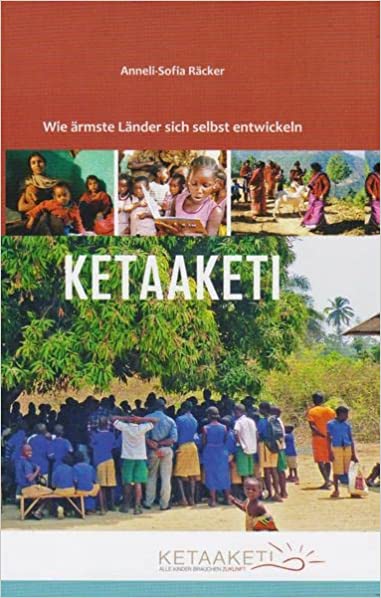
Anneli-Sofia Räcker:
"How poorest countries develop themselves"
May 2022: With her book “How the poorest countries develop themselves”, Anneli-Sofia Räcker introduces you to a completely new perspective on development cooperation.
Find out more about the innovative KETAAKETI thinking and action model, the vision behind it and a new attitude.

Anneli-Sofia Räcker:
"How poorest countries develop themselves"
May 2022: With her book “How the poorest countries develop themselves”, Anneli-Sofia Räcker introduces you to a completely new perspective on development cooperation.
Find out more about the innovative KETAAKETI thinking and action model, the vision behind it and a new attitude.



